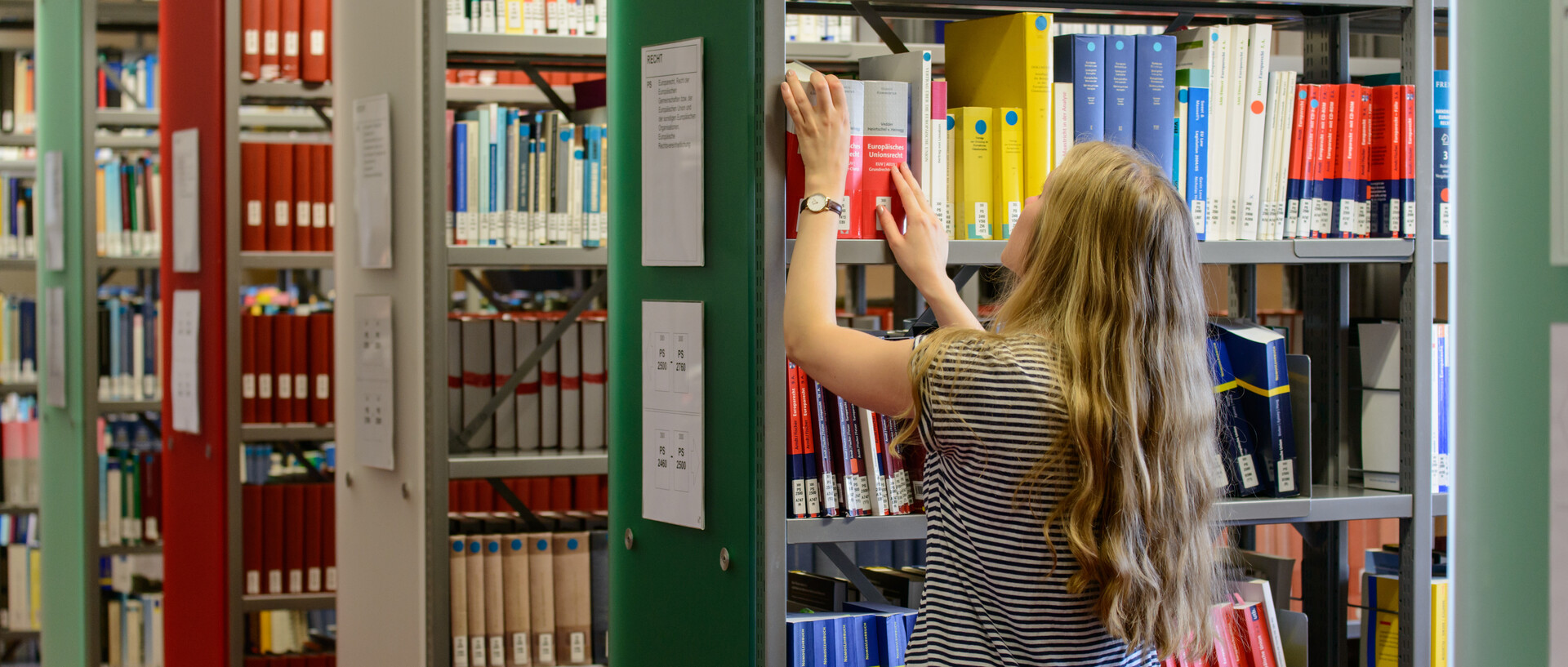Course Reserves
You want to provide your students with course-related material?
You can do so by placing items on reserve at your respective library or by creating a copyright compliant, digital course reserve on the learning platform ILIAS.
Physical course reserves
Course reserve items are excluded from circulation and remain on reserve for the entire semester. The Primo catalog indicates whether an item is on course reserve. Course reserves may include items from the entire library collection. Items from other libraries or privately owned items may be included, as well. However, this will be at your own risk. The University Library is not liable for any loss or damage.
Course reserve request and renewal
Please submit your course reserve requests early. Ideally, you submit your request to the respective library four weeks before the semester begins. Send us the completed form along with a list of your requested items, including their call numbers.
Course reserves remain available until the end of the semester, 31 January and 31 July, respectively. Please submit any renewal requests to your respective library.
Course reserve request
Digital course reserve
If you would like to make copyright protected material available to the participants of your course via the learning platform ILIAS, section 60a of the Act on Copyright and Related Rights (Urheberrechtsgesetz (UrhG)) provides the legal framework. Here is a short overview:
For illustration in teaching and research, you may make available for non-commercial purposes and in electronic form:
- up to 15 percent of a published work
- illustrations, individual articles from the same professional or academic journal, other small-scale works and out-of-print works in full text
Articles from newspapers or popular magazines may not be made available in full text. “Small-scale works” means printed works up to 25 pages and videos and music up to 5 minutes.
The materials may only be made available
- to teachers and participants of the relevant course – e. g. password-protected on ILIAS
- to teachers and examiners at the same educational institution and
- to third persons insofar as this serves to present classes, results of classes or learning outcomes at the educational institution.
Read more
- Section 60a UrhG Teaching in educational establishments
- Federal Ministry of Education and Research (Bundesministerium für Bildung und Forschung (BMBF)) (July 2023): Urheberrecht in der Wissenschaft – Ein Überblick für Forschung, Lehre und Bibliotheken (PDF, 2 MB, in German)
- Kreutzer, Till/
Hirche, Tom (October 2017): Rechtsfragen zur Digitalisierung in der Lehre: Praxisleitfaden zum Recht bei E-Learning, OER und Open Content (in German) (PDF, 865 KB)
You will find more information on the copyright website of the University Library.
Linking to digital resources
If the e-books or articles in e-journals are already in the University Library’s collection, you can easily link to these resources in your digital course reserve.
E-books
Our e-books can be accessed via the Primo catalog. Use permalinks to link from ILIAS to e-books in the Primo catalog.
E-journals
E-journals can be accessed via the Primo catalog, via the Electronic Journal Library (Elektronische Zeitschriftenbibliothek (EZB)), or directly through specialist databases. Many journals and databases support permalinks so that you can link to licensed resources.
Access to e-books and e-journals
University members can access electronic resources licensed by the library on campus and via the wireless network eduroam. Generally, university members can access these resources also remotely, Remote access is possible by using
- the VPN client
- via Shibboleth. Some electronic resources may not be accessed via VPN.
Access to press articles
Copyright-protected articles from newspapers or popular magazines must not be made available in full text. However, you and your students may access press articles via our licensed newspaper portals, press archives and online editions of newspapers. Many newspapers and databases support permalinks so that you can link to licensed resources.
Newspaper portals
Includes: The Economist, Financial Times, Wall Street Journal
Includes: The New York Times, Financial Times, The Guardian
You may include individual articles from the Factiva database in digital course reserves. The original source of the article must be referenced. In addition, you must indicate Factiva as source. The article must be deleted when no longer needed for the intended purpose.
Includes: The New York Times, The Guardian
Includes: Handelsblatt, WirtschaftsWoche, DIE ZEIT
Press archives
The F.A.Z. allows you to use articles from the F.A.Z.-Bibliotheksportal for the purpose of illustrating for teaching, especially in digital course reserves. The F.A.Z.-Bibliotheksportal can be accessed via our campus license. In all other respects, the use is governed by the conditions of section 60a, para. 1 UrhG.
Online editions of newspapers
You will find all licensed online editions of newspapers in the Primo catalog. Use the Advanced Search option and restrict your search by choosing “journals“ as Material Type.
Contact
Learning platform ILIAS
ILIAS Advisory Services
University of Mannheim
Referat Hochschuldidaktik und eLearning
Kaiserring 10–16
68161 MannheimE-mail: hdzadminuni-mannheim.deCopyright-related support
 Credit: Sebastian Weindel
Credit: Sebastian WeindelDr. Marion von Francken-Welz
Deputy Head of the Acquisition and Cataloging Department | Subject Librarian for LawUniversity of Mannheim
University Library
Schloss Ehrenhof – Room M 305
68161 Mannheim
